The desperation to retain the turf created a situation that PAGD candidates at various places are contesting against the parties that make the alliance. It is obvious that the Kashmir leaderships’ handshake has not been accepted on the ground. Yawar Hussain explains the spectacle in wake of historic realties
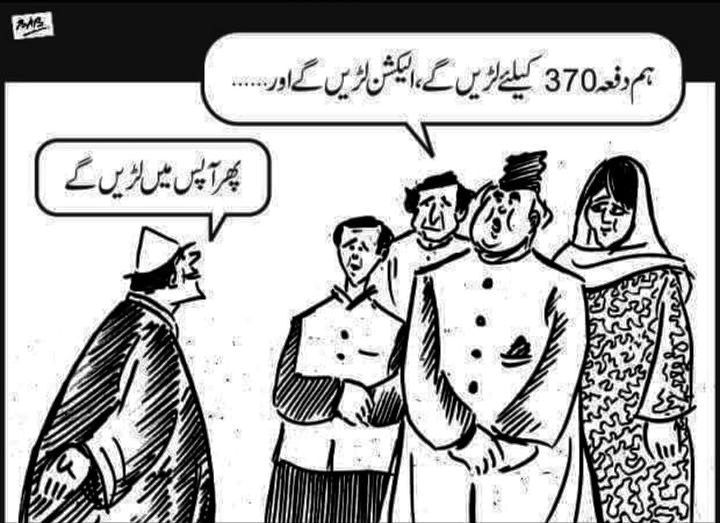
With Kashmir’s traditional rivals in politics joining hands post 5/8 to form Peoples’ Alliance for Gupkar Declaration (PAGD), the fault lines separating their turfs refuse to dissipate despite the leadership bonhomie. Throughout the post-partition history, the rivals have fed their followers with so much hate against each other that now political identities at ground zero defy the leadership.
There is a groundswell of support in PAGD’s favour but it is so wavering in certain areas that it can upset the calculations of top Kashmir parties. PAGD leaders admit they had not envisioned it. There are rebellions within the parties. At countless places, a PAGD candidate is in the contest against proxy candidates of the PAGD constituents.
Clueless PAGD
In Budgam, the PAGD failed to knit an alliance with all its constituents and eventually, the parties decided to fight each other. In the first three nomination lists, PAGD announced candidatures for the district but the PDP local leader Nazir Ahmad Khan chose to contest himself against the official PAGD candidate from Beerwah. He even nominated his candidates from every segment in Beerwah.
PDP General Secretary Ghulam Nabi Lone Hanjura, who also represents his party in the alliance, publicly accused the NC of fielding proxies and allotting just one seat from Budgam to the PDP.
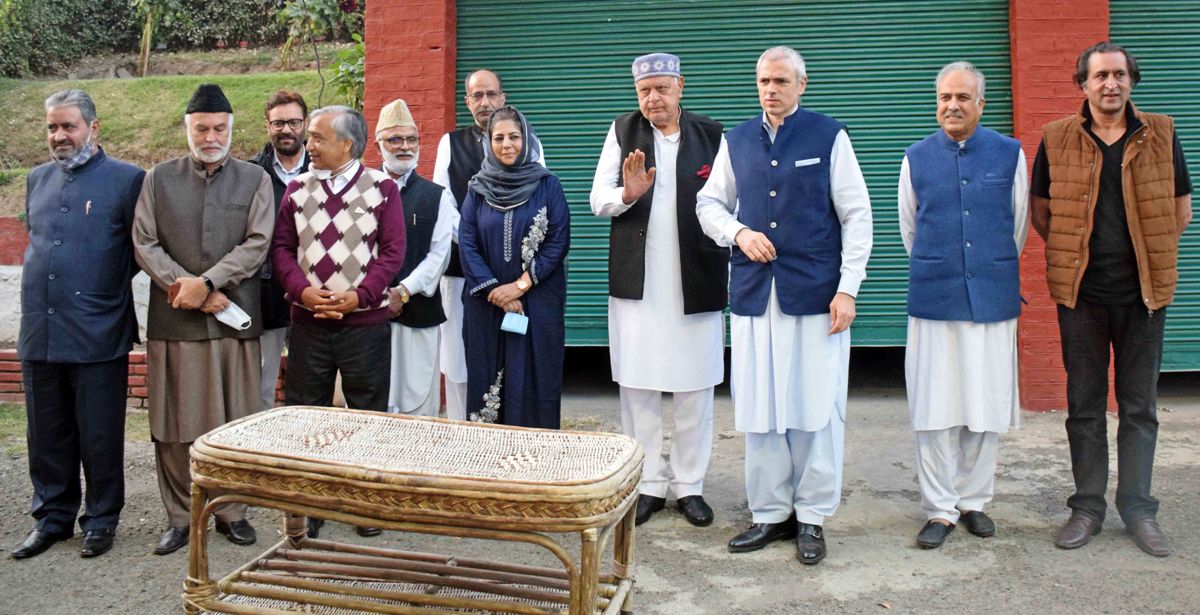
Later, he told Kashmir Life that there is a “friendly contest” on all seats in Budgam. His son, Gowhar Lone is fighting against NC leader Abdul Rahim Rather’s candidate from the Surasyar DDC segment. The story is similar elsewhere.
Nizam-ud-din Bhat said DDC elections are an eye-opener for the PAGD to see the differences on the ground. “PAGD will have many lessons to draw from the ongoing exercise of DDC polls,” Bhat said. “One foremost is to identify elements within, who disregard unity.”
In South Kashmir’s Hillad-Shahbad DDC segment, both NC and PDP are in the fray against each other. NC loyalist Zafarullah Khan from Urju village of the region claims that he is the official alliance candidate while his counterpart Mushtaq Khan of PDP also claims the same.
Congress which initially was part of PAGD has also fielded its candidate, Akhtar Kasana. Farooq Ganai, son of former NC legislature Akbar Ganai is also in the fray. Farooq was also earlier associated with NC but is now contesting independently. Farooq Ahmad Bhat, who was denied a ticket from the block by NC, is also contesting independently.
People laugh at both and eventually will go either with their own party preferences or chose a new stakeholder.
Senior NC and PDP leaders admit that there are proxy candidates from both sides against the official PAGD candidate.
A senior PDP leader from south Kashmir, wishing anonymity, said there are “proxy” candidates across the Valley. He said questions should be asked to the PAGD executive as to why there are alliance constituent candidates against the official candidates.
Like Beerwah, in Kupwara’s Lolab the NC has put up Nasir Lone as a PAGD candidate from the Sogam DDC segment. His immediate rival is neither Apni Party nor BJP but PDP.
Nasir Lone said that the decision to fight together was taken by the leadership in a room but it is difficult on the ground. Still, he said, “I am optimistic.”
In Reddi Chowkibal (Kupwara), the PAGD has given the mandate to Habibulla Beigh of JKPC. But NC leader Javaid Ahmad Mir has decided to contest as an independent.
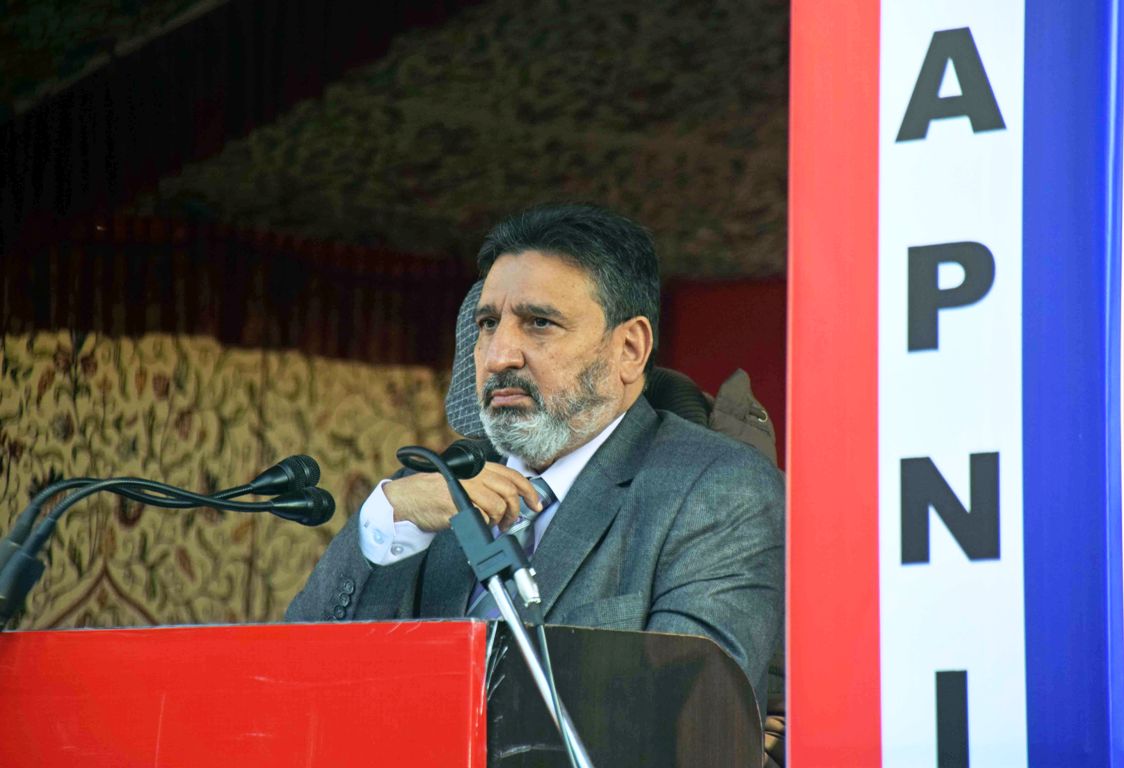
In Baramulla, Khurshid Ahmad Khan, a JKPC leader is contesting as an independent against PAGD’s official candidate Shabir Ahmad Lone from the NC.
Even though leaders across PAGD aren’t coming out openly against the differences on the ground, the party cadres reveal how the constituent PAGD parties were fighting each other on the ground.
In Ganderbal, where NC leader Ishfaq Jabbar’s wife is contesting as a PAGD candidate, the PDP has fielded a proxy. Bashir Wagay a PDP worker from the area said he would be voting against the alliance candidate in favour of the local PDP nominee.
“Alliance is for a larger cause but here the fight is between NC and PDP. This seat should have gone to PDP,” Wagay said. “Our candidate would win and be part of PAGD.”
Across Kashmir, the “proxy” candidates are contesting as independent candidates but their affiliation to politicians is no secret.
In Vilgam (Handwara), Mohammad Yasin Bhat an independent was declared the winner of a Panch seat to everyone’s surprise. PC’s candidate, Bashir Ahmad, supported officially by the NC and the PDP lost the seat.
“The PAGD bonhomie at the top hasn’t reached the grassroots level. In all such alliances, we have a bitter experience that a party’s supporters do not vote for traditional rivals,” a senior PC leader said. “We expect similar result throughout Kashmir.”
Some commentators even think Kashmir political parties are reaping what they have sown over the years. Kashmir’s demography has traditionally remained divided between pro and anti-India groups and then sub-divided in innumerable compartments within. In a way, it predates the partition.
The Sher-Bakra Divide
The lion-goat divide has remained a crisis of urban Kashmir since the 1930s. Sher, the NC supporters and Bakra, the supporters of Mirwaiz, would routinely fight each other on an almost daily basis. The rivalry is traced back to the days when Molvi Mohammed Yousuf Shah got elevated as Mirwaiz (Head Priest) of Kashmir. In those days the younger Kashmiri generation of the time was yearning for freedom from Dogra Rule.
The younger generation was striving to utilize the influential stage of Jamia Masjid, Srinagar for propagating their message while the officials of the Maharaja’s dispensation were busy in hatching conspiracies to deflate the freedom balloon.
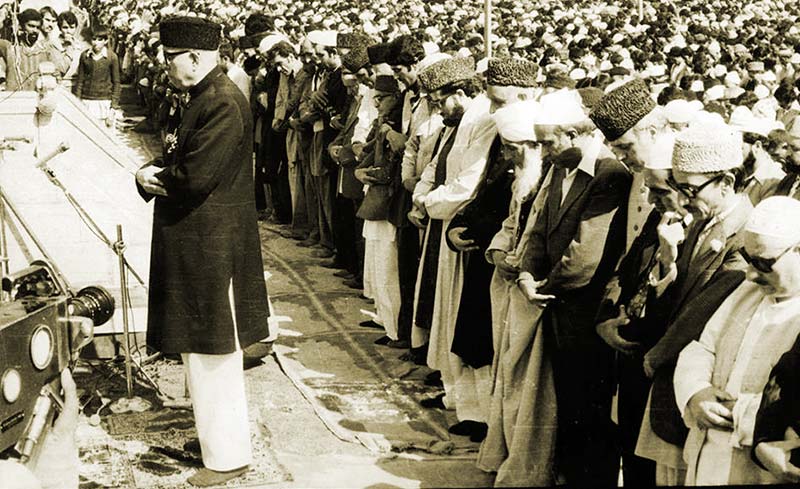
After a few months of Molvi Mohammed Yousuf Shah’s anointment, a group of people bullied and roughed up innocent visitors at Jamia Masjid during a sermon delivery.
Following this incident, Sheikh Mohammad Abdullah was arrested on January 28, 1932, and sentenced to six months of rigorous imprisonment. A perception was created by Maharaja’s administration that the Mirwaiz had a covert hand in the arrest and sentence of Abdullah. On January 30, 1932, Shah during a religious sermon at Khanyar, Srinagar vehemently denied that he had contributed to the arrest of Shiekh. On June 6, 1932, Abdullah was released from Jail and he stressed on unity. By then, however, the society had been divided. The division broke the families till, in 1983, the Double Farooq Accord took place. The two parties with Congress fought the Muslim United Front (MUF) jointly in 1987.
“Infidel” Congressmen
NC’s power monopoly ended when the first-ever unit of Indian National Congress (INC) was established in the erstwhile Jammu and Kashmir state in 1964 with Ghulam Mohammad Sadiq becoming the first-ever non-NC chief minister on January 26, 1965.
The Congress-led federal government had jailed NC founder and former Prime Minister Sheikh Mohammad Abdullah in 1953 and replaced him with his deputy Bakshi Ghulam Mohammad.
Post-1965, Congress faced a social boycott. They were being termed as “worms of the gutter” – Gundi Naali Kay Keaday. The bitterness of the crisis can be gauged from the former Congress Chief Minister, Syed Mir Qasim’s autobiography, My Life and Times in which he details how the congress supporters were asked to not bury their dead in Muslim graveyards’. Even barbers, Qasim mentioned, refused to shave the Congressmen while Sheikh Abdullah “warned” that any Muslim who became a member of the Congress party would dig his own grave.
However, with the Indira-Sheikh accord in 1975, Congress paved the wave for the return of NC to power but the fault lines among the workers only widened. This is despite the fact that the two parties are close allies since 1987.
NC versus Jamaat
NC and Jamaat-e-Islami did not fight each other till the latter in 1972 contest polls against the boycott decision by the Plebiscite Front. The relations never improved. In 1975, Sheikh banned Jamaat during the emergency and seized their schools. Four years later in 1979, when Zulfikar Ali Bhutto was hanged in Pakistan, the Jamaat faced the public ire and eventually accused NC of the conspiracy.
Jamaat families were targeted, their homes, institutions and their apple orchards were destroyed in the two and half-day violence across Kashmir. This eventually led to the constitution of MUF in 1987, the elections of which were rigged and a year, militancy had started.
NC vs PDP
Till 2002, the NC had managed to survive challenges posed by Congress along with intermittent opposition by few regional parties. But the constitution of PDP in 1999 by Congressman Mufti Mohammad Sayeed was a landslide event. Though NC insists it happened to divide the Kashmir mandate, the two-party system had started exhibiting its crisis in Kashmir where they were always dependent on a third party.
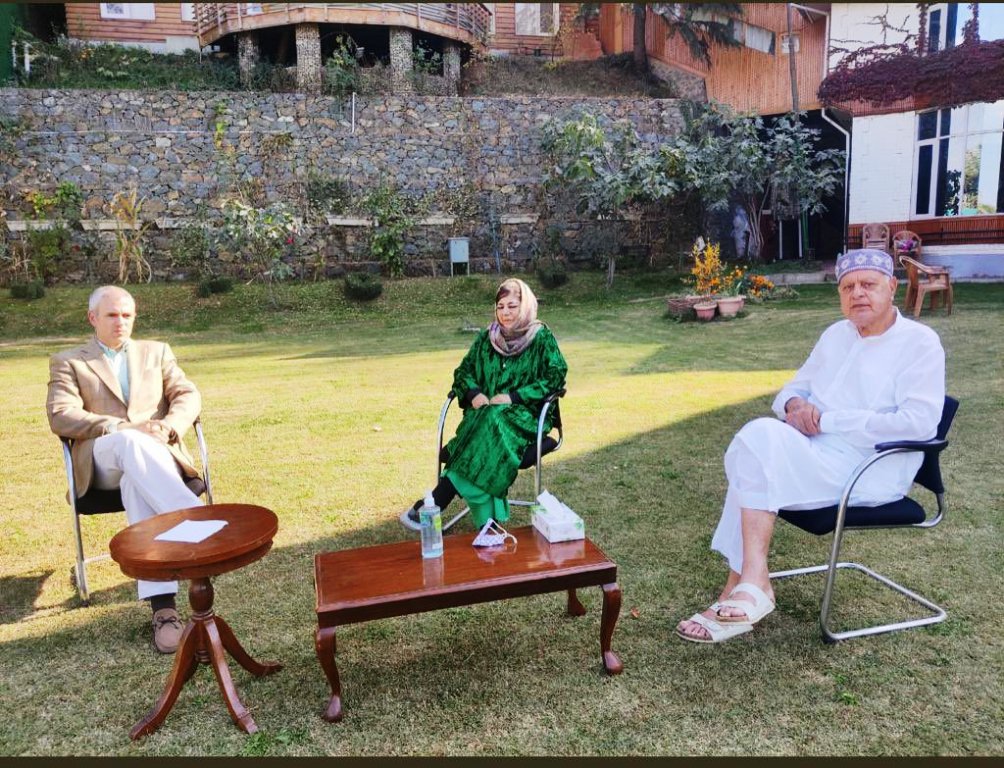
The NC and PDP fought each other for nearly two decades till 2019 when Jammu and Kashmir was stripped of its special status and divided into twin union territories. During the last two decades, the PDP has gradually emerged as the most voted party in the assembly elections.
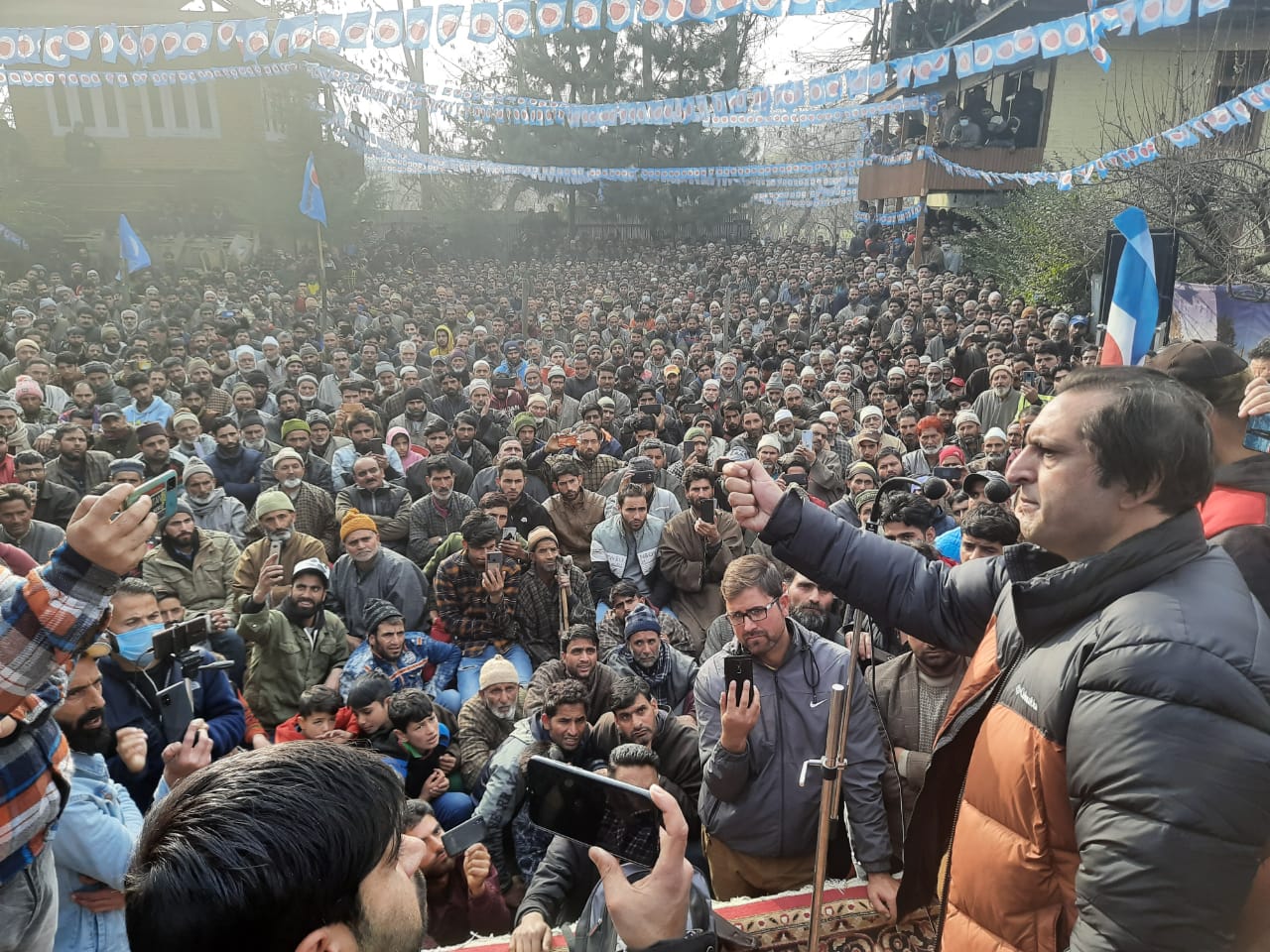
As the NC and PDP gradually emerged to the centre stage of being the two main stakeholders of Kashmir, it has come in between the aspirations of many others. Congress is much older than PDP and even Peoples Conference is an old political party. While leaders of all these parties feel forced by the 5/8 decision-making to mend fences, the people will take a long time to reconsider their political identity. It is this historic rivalry that is playing on the ground.
Eventually, all the winners from the PAGD allies who will win on the alliance, party mandate or as independents will count as the alliance faces. Or that is the being thought quite loudly on Gupkar.















